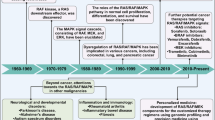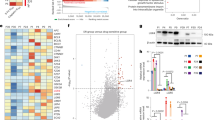Abstract
Glioblastoma (GBM) is a highly malignant type of brain tumor with limited treatment options. Recent research has focused on epigenetic regulatory factors, such as Enhancer of Zeste Homolog 2 (EZH2), which plays a role in gene expression through epigenetic modifications. EZH2 inhibitors have been developed as potential therapeutic agents for GBM, but resistance to these inhibitors remains a considerable challenge. This study aimed to investigate the role of ribosomal S6 protein kinase 4 (RSK4) in GBM and its association with resistance to EZH2 inhibitors. We first induced drug resistance in primary GBM cell lines by treatment with an EZH2 inhibitor and observed increases in the expression of stemness markers associated with glioblastoma stem cells (GSCs) in the drug-resistant cells. We also found high expression of RSK4 in GBM patient samples and identified the correlation of high RSK4 expression with poor prognosis and GSC marker expression. Further experiments showed that knocking down RSK4 in drug-resistant GBM cells restored their sensitivity to EZH2 inhibitors and decreased the expression of GSC markers, thus reducing their self-renewal capacity. From a mechanistic perspective, we discovered that RSK4 directly phosphorylates EZH2, activating the EZH2/STAT3 pathway and promoting resistance to EZH2 inhibitors in GBM. We also found that combining EZH2 inhibitors with an RSK4 inhibitor called BI-D1870 had better inhibitory effects on GBM occurrence and progression in both in vitro and in vivo experiments. In conclusion, this study demonstrates that RSK4 enhances cancer stemness and mediates resistance to EZH2 inhibitors in GBM. Combination treatment with EZH2 inhibitors and RSK4 inhibitors is a promising potential therapeutic strategy for GBM. Collectively, our results strongly demonstrate that RSK4 regulates the EZH2/STAT3 pathway to promote GSC maintenance and EZH2i resistance in a PRC2-independent manner, indicating that RSK4 is a promising therapeutic target for GBM.
This is a preview of subscription content, access via your institution
Access options
Subscribe to this journal
Receive 12 print issues and online access
$259.00 per year
only $21.58 per issue
Buy this article
- Purchase on Springer Link
- Instant access to full article PDF
Prices may be subject to local taxes which are calculated during checkout







Similar content being viewed by others
Data availability
Please contact the corresponding author for data requests.
References
Schaff LR, Mellinghoff IK. Glioblastoma and other primary brain malignancies in adults: a review. JAMA. 2023;329:574–87.
Berger TR, Wen PY, Lang-Orsini M, Chukwueke UN. World Health Organization 2021 classification of central nervous system tumors and implications for therapy for adult-type gliomas: a review. JAMA Oncol. 2022;8:1493–501.
Horbinski C, Berger T, Packer RJ, Wen PY. Clinical implications of the 2021 edition of the WHO classification of central nervous system tumours. Nat Rev Neurol. 2022;18:515–29.
Phillips RE, Soshnev AA, Allis CD. Epigenomic reprogramming as a driver of malignant glioma. Cancer Cell. 2020;38:647–60.
Krug B, Harutyunyan AS, Deshmukh S, Jabado N. Polycomb repressive complex 2 in the driver’s seat of childhood and young adult brain tumours. Trends Cell Biol. 2021;31:814–28.
Paskeh MDA, Mehrabi A, Gholami MH, Zabolian A, Ranjbar E, Saleki H, et al. EZH2 as a new therapeutic target in brain tumors: Molecular landscape, therapeutic targeting and future prospects. Biomed Pharmacother. 2022;146:112532.
Kim KH, Roberts CW. Targeting EZH2 in cancer. Nat Med. 2016;22:128–34.
Wiese M, Schill F, Sturm D, Pfister S, Hulleman E, Johnsen SA, et al. No significant cytotoxic effect of the EZH2 inhibitor tazemetostat (EPZ-6438) on pediatric glioma cells with wildtype histone 3 or mutated histone 3.3. Klin Padiatr. 2016;228:113–7.
Mohammad F, Weissmann S, Leblanc B, Pandey DP, Hojfeldt JW, Comet I, et al. EZH2 is a potential therapeutic target for H3K27M-mutant pediatric gliomas. Nat Med. 2017;23:483–92.
de Vries NA, Hulsman D, Akhtar W, de Jong J, Miles DC, Blom M, et al. Prolonged Ezh2 depletion in glioblastoma causes a robust switch in cell fate resulting in tumor progression. Cell Rep. 2015;10:383–97.
Jin H, Wang L, Bernards R. Rational combinations of targeted cancer therapies: background, advances and challenges. Nat Rev Drug Discov. 2023;22:213–34.
Romeo Y, Zhang X, Roux PP. Regulation and function of the RSK family of protein kinases. Biochem J. 2012;441:553–69.
Dummler BA, Hauge C, Silber J, Yntema HG, Kruse LS, Kofoed B, et al. Functional characterization of human RSK4, a new 90-kDa ribosomal S6 kinase, reveals constitutive activation in most cell types. J Biol Chem. 2005;280:13304–14.
Chen L, Xu T, Jia Q, Wang X, Li M, Liang G. RSK4: a new prognostic factor in glioma. Pathol Res Pract. 2020;216:153020.
Xu J, Jia Q, Zhang Y, Yuan Y, Xu T, Yu K, et al. Prominent roles of ribosomal S6 kinase 4 (RSK4) in cancer. Pathol Res Pract. 2021;219:153374.
Liu Y, He W, Guo Y, Qu S, Yao F, Liu J, et al. CSNK1D is associated with stemness and invasiveness in glioblastoma. Pathol Res Pract. 2022;240:154187.
Cai J, Ma H, Huang F, Zhu D, Zhao L, Yang Y, et al. Low expression of RSK4 predicts poor prognosis in patients with colorectal cancer. Int J Clin Exp Pathol. 2014;7:4959–70.
He Q, He R, Luo W, Gan X, Ma J, Chen G, et al. Expression of RSK4 in lung adenocarcinoma tissue and its clinicopathological value: a study based on RNA-seq data and immunohistochemistry. Int J Clin Exp Pathol. 2017;10:11405–14.
Thakur A, Rahman KW, Wu J, Bollig A, Biliran H, Lin X, et al. Aberrant expression of X-linked genes RbAp46, Rsk4, and Cldn2 in breast cancer. Mol Cancer Res. 2007;5:171–81.
Fan L, Li P, Yin Z, Fu G, Liao DJ, Liu Y, et al. Ribosomal s6 protein kinase 4: a prognostic factor for renal cell carcinoma. Br J Cancer. 2013;109:1137–46.
Serra V, Eichhorn PJ, Garcia-Garcia C, Ibrahim YH, Prudkin L, Sanchez G, et al. RSK3/4 mediate resistance to PI3K pathway inhibitors in breast cancer. J Clin Invest. 2013;123:2551–63.
Bender C, Ullrich A. PRKX, TTBK2 and RSK4 expression causes Sunitinib resistance in kidney carcinoma- and melanoma-cell lines. Int J Cancer. 2012;131:E45–55.
Wang A, Qu L, Wang L. At the crossroads of cancer stem cells and targeted therapy resistance. Cancer Lett. 2017;385:87–96.
Seguin L, Kato S, Franovic A, Camargo MF, Lesperance J, Elliott KC, et al. An integrin beta(3)-KRAS-RalB complex drives tumour stemness and resistance to EGFR inhibition. Nat Cell Biol. 2014;16:457–68.
Mikami S, Mizuno R, Kosaka T, Saya H, Oya M, Okada Y. Expression of TNF-alpha and CD44 is implicated in poor prognosis, cancer cell invasion, metastasis and resistance to the sunitinib treatment in clear cell renal cell carcinomas. Int J Cancer. 2015;136:1504–14.
Seo AN, Lee HJ, Kim EJ, Jang MH, Kim YJ, Kim JH, et al. Expression of breast cancer stem cell markers as predictors of prognosis and response to trastuzumab in HER2-positive breast cancer. Br J Cancer. 2016;114:1109–16.
Miranda TB, Cortez CC, Yoo CB, Liang G, Abe M, Kelly TK, et al. DZNep is a global histone methylation inhibitor that reactivates developmental genes not silenced by DNA methylation. Mol Cancer Ther. 2009;8:1579–88.
Qi W, Chan H, Teng L, Li L, Chuai S, Zhang R, et al. Selective inhibition of Ezh2 by a small molecule inhibitor blocks tumor cells proliferation. Proc Natl Acad Sci USA. 2012;109:21360–5.
Knutson SK, Wigle TJ, Warholic NM, Sneeringer CJ, Allain CJ, Klaus CR, et al. A selective inhibitor of EZH2 blocks H3K27 methylation and kills mutant lymphoma cells. Nat Chem Biol. 2012;8:890–6.
Huang X, Yan J, Zhang M, Wang Y, Chen Y, Fu X, et al. Targeting epigenetic crosstalk as a therapeutic strategy for EZH2-aberrant solid tumors. Cell. 2018;175:186–99.e119.
Drosos Y, Myers JA, Xu B, Mathias KM, Beane EC, Radko-Juettner S, et al. NSD1 mediates antagonism between SWI/SNF and polycomb complexes and is required for transcriptional activation upon EZH2 inhibition. Mol Cell. 2022;82:2472–89.e2478.
Zhang T, Guo Z, Huo X, Gong Y, Li C, Huang J, et al. Dysregulated lipid metabolism blunts the sensitivity of cancer cells to EZH2 inhibitor. EBioMed. 2022;77:103872.
Guryanova OA, Wu Q, Cheng L, Lathia JD, Huang Z, Yang J, et al. Nonreceptor tyrosine kinase BMX maintains self-renewal and tumorigenic potential of glioblastoma stem cells by activating STAT3. Cancer Cell. 2011;19:498–511.
Fan X, Khaki L, Zhu TS, Soules ME, Talsma CE, Gul N, et al. NOTCH pathway blockade depletes CD133-positive glioblastoma cells and inhibits growth of tumor neurospheres and xenografts. Stem Cells. 2010;28:5–16.
Verhaak RG, Hoadley KA, Purdom E, Wang V, Qi Y, Wilkerson MD, et al. Cancer Genome Atlas Research, integrated genomic analysis identifies clinically relevant subtypes of glioblastoma characterized by abnormalities in PDGFRA, IDH1, EGFR, and NF1. Cancer Cell. 2010;17:98–110.
Funding
This work was supported by the Key Research and Development Projects of Shaanxi Province (No.2023-YBSF-129, 2022SF-029), the National Natural Science Foundation of China (No.82103522, 82373368), the China Postdoctoral Science Foundation (No.2021TQ0362).
Author information
Authors and Affiliations
Contributions
FP, LZ, ML: data acquisition; XY, YW, PY: immunohistochemistry and Western blot; BW, JJ, YT, XY: clinical sample collection and data analysis; LC, JX, LW: study design, project administration and revision of manuscript. All authors have reviewed the final version of the manuscript and approved it for publication.
Corresponding authors
Ethics declarations
Competing interests
The authors declare no competing interests.
Ethics approval and consent to participate
All animal experiments were carried out in compliance with the principles and methods stated in the Guideline for the Care and Use of Laboratory Animals in the Air Force Medical University. The studies involving human participants were reviewed and approved by the Medical Ethical Committee of Xijing Hospital. The patients/participants provided their written informed consent to participate in this study.
Consent for publication
All authors have reviewed the final version of the manuscript and approved it for publication.
Additional information
Publisher’s note Springer Nature remains neutral with regard to jurisdictional claims in published maps and institutional affiliations.
Supplementary information
Rights and permissions
Springer Nature or its licensor (e.g. a society or other partner) holds exclusive rights to this article under a publishing agreement with the author(s) or other rightsholder(s); author self-archiving of the accepted manuscript version of this article is solely governed by the terms of such publishing agreement and applicable law.
About this article
Cite this article
Pang, F., Zhang, L., Li, M. et al. Ribosomal S6 protein kinase 4 promotes resistance to EZH2 inhibitors in glioblastoma. Cancer Gene Ther 30, 1636–1648 (2023). https://doi.org/10.1038/s41417-023-00666-3
Received:
Revised:
Accepted:
Published:
Issue Date:
DOI: https://doi.org/10.1038/s41417-023-00666-3



